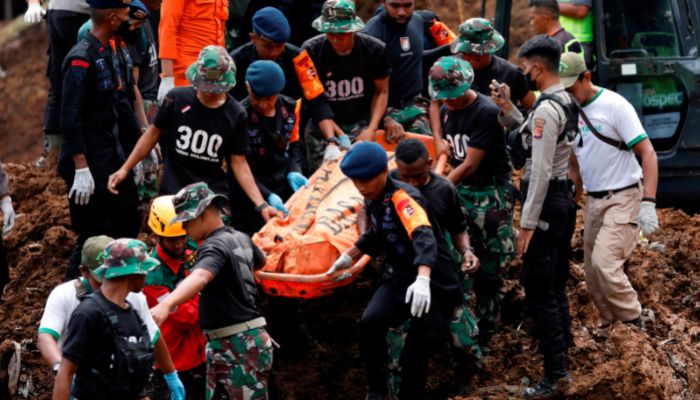Death toll from Indonesia's earthquake rises to 268
Over 1,000 people have been injured, 58,000 displaced and 22,000 houses damaged
November 22, 2022

- Death toll from earthquake expect to rise.
- Dozens trapped in the rubble: officials.
- Some areas were cut off by landslide.
JAKARTA: The death toll from an earthquake that hit Indonesia's Cianjur town in western Java has risen to 268, the local government said in an Instagram post on Tuesday.
Disaster agency chief Suharyanto told reporters that more than 1,000 people had been injured, 58,000 displaced and 22,000 houses damaged.
Many children were killed in an earthquake in Indonesia when their schools collapsed, officials said, as rescuers raced to reach people trapped in rubble in a devastated town on Java island.
Hundreds of people were injured in the Monday quake and officials warned the death toll was likely to rise.
The shallow 5.6-magnitude quake struck in mountains in Indonesia's most populous province of West Java, causing significant damage to the town of Cianjur and burying at least one village under a landslide.
Landslides and rough terrain were hampering rescue efforts, said Henri Alfiandi, head of the National Search and Rescue Agency (Basarnas).
"The challenge is the affected area is spread out ... On top of that, the roads in these villages are damaged," Alfiandi told a news conference, adding that more than 13,000 people had been evacuated.
"Most of the casualties are children because at 1pm they were still at school," he said, referring to the time the quake hit.
President Joko Widodo travelled to Cianjur on Tuesday to encourage rescuers.
"My instruction is to prioritise evacuating victims that are still trapped under rubble," said the president.
While strong earthquakes of magnitude 6 or 7 are relatively common in Indonesia, often off-shore where fault lines run, Monday's quake of a lower magnitude had such deadly consequences because if struck on land at a relatively shallow depth.
Officials said many of the dead were killed when poorly constructed buildings collapsed with the president calling for reconstruction efforts to include earthquake-proof housing.
Survivors gathered overnight in a Cianjur hospital parking lot. Some of the injured were treated in tents, others were hooked up to intravenous drips on the pavement as medical workers stitched up patients under torchlight.
"Everything collapsed beneath me and I was crushed beneath this child," Cucu, a 48-year-old resident, told Reuters.
"Two of my kids survived, I dug them up ... Two others I brought here, and one is still missing," she said through tears.
"Many dead bodies are lying on the hospital grounds, it's very crowded," said her relative, Hesti.
Footage from Kompas TV showed people holding cardboard signs asking for food and shelter, with emergency supplies seemingly yet to reach them.
Hundreds of police officers were deployed to help the rescue effort, Dedi Prasetyo, a national police spokesperson told the Antara state news agency.
"Today's main task order for personnel is to focus on evacuating victims," he said.
'Swept away'
The death toll from the earthquake had risen to 252, the district government said in a post on social media. The death toll from the national disaster agency (BNPB) stood at 103, with 31 missing.
Cianjur police chief told Metro TV that 20 people had been evacuated from the district of Cugenang, most of whom had died, with residents reporting missing family members.
The area was hit by a landslide triggered by the quake that had blocked access to the area.
"At least six of my relatives are still unaccounted for, three adults and three children," said Zainuddin, a resident of Cugenang.
"If it was just an earthquake only the houses would collapse, but this is worse because of the landslide. In this residential area, there were eight houses, all of which were buried and swept away."
Rescue efforts were complicated by electricity outages in some areas, and more than 100 aftershocks.
Straddling the so-called Ring of Fire, a highly seismically active zone where different plates on the earth's crust meet, Indonesia has a history of devastating earthquakes.
In 2004, a 9.1 magnitude quake off Sumatra island in northern Indonesia triggered a tsunami that struck 14 countries, killing 226,000 people.











